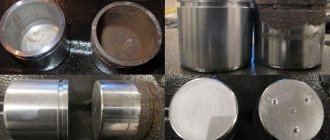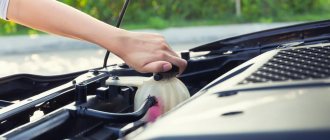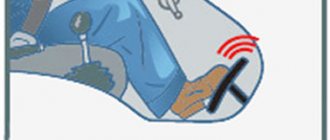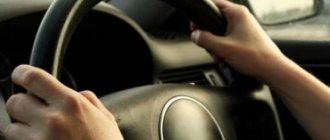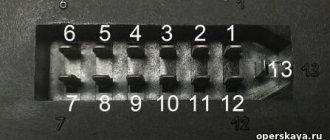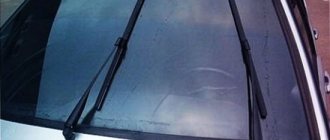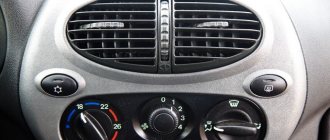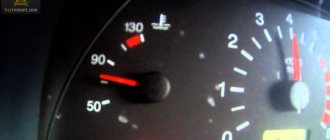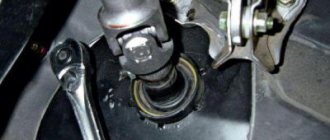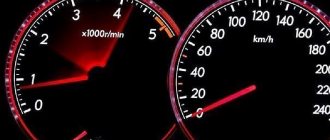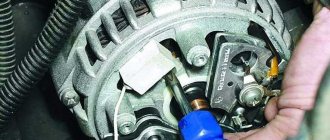Noise | Possible reason |
| The sound of metal grinding | Stop driving! Usually caused by worn brake pads. |
| Hit from behind | Difficult to diagnose, but usually it's the rear brake drums. |
| Squeak | Either cheap brake pads or the brake pad wear indicator has gotten on the brake rotor. |
| Knocking or squealing | If your car has been parked outside for a long time, it may be caused by rusty brake discs. |
| Scraping sound | There may be a stone on the brake pad or caliper. |
The appearance of noise when you press the brake pedal is a “bell” that is worth paying attention to
Hearing your brakes grind when you press the brake pedal is like driving at high speed on the highway with your low tire pressure light on; if you hear this, you need to stop moving as quickly as possible.
See also : Why do Porsche brakes squeak?
Braking noise that sounds like a grinding sound is usually caused by a lack of brake material on the brake pads: the pads and brake rotors rub against each other (metal-to-metal). When the brake pads are not worn out, they are covered with a special layer of friction material, which interacts with the brake disc during braking.
Naturally, the coating of the pads wears out over time, and then the metal base of the pads begins to grind the brake discs, which can damage them. So brake pads are like bars of soap that get smaller as you use them. Unfortunately, unlike soap, if we don't replace our brake pads on time, we risk leaving our car without brakes. This is why it is so important to replace your brake pads on time.
If you don't do this and the brake pads reach their limit, you must remember that every time you press the brake pedal you are killing the brake rotors. The terrible noise from worn brake pads is the voice of your car telling you, “You're killing me!” And the sooner you change the pads, the less damage you will cause to the brake system. You know, auto mechanics and car service owners have a favorite abbreviation consisting of three letters SKD: calipers, pads and discs.
Why beloved? The thing is, when you receive a bill for the work associated with this abbreviation, you will need CPR (cardiopulmonary resuscitation).
So, if you don't want to be shocked by the cost of replacing major brake system components because your old brake pads have killed your brake rotors and caused your calipers to fail, make sure to get your brake pads replaced in a timely manner.
The main rule here is this: if the brake pads are worn out, you can’t drive. In this case, call a tow truck. Yes, it's expensive. But believe me, in the long run your expenses will pay off. And it’s better, of course, not to let the pads wear out completely. Change them in advance.
About service
Like any other system in a car, brakes require regular maintenance. In the case of a hydraulic mechanism, it is necessary to periodically replace the pads - they tend to wear out
It is important to monitor the condition of both discs and pads from time to time. Drum brakes also need to be checked regularly.
As for the drive itself, they check the condition of the lines, visually diagnose the system for fluid leaks, and monitor its level in the tank.
Also, after any maintenance work on the car's brake system, it is necessary to bleed it. This is done in order to remove air from the lines. The presence of air in the pipeline can reduce the effectiveness of the brakes, or even affect their performance. Since the system does not have a large number of different components, many consider it to be unusually reliable and think that with proper care it will not cause any serious problems to the owner. However, this is not always the case. Problems can arise in structures of any complexity. One of the most common problems with brakes is characteristic sounds when braking. A knocking noise occurs when you press the pedal.
Loud noise from rear when braking
This is a brake problem that also often irritates drivers and blows the minds of auto mechanics. Sometimes, even experienced auto mechanics can take a long time to determine the cause of knocking noise in the rear wheels when braking.
Sometimes it happens that after you disassemble the entire rear brake system, find nothing wrong and lubricate each component, checking all the clearances of each part of the rear brake system, the noise remains. This is especially true for those cars that use brake drums at the rear, which, as a rule, are the source of knocking when braking.
Over time, an invisible groove (groove) may appear on the brake drums. If the grooves are small, they can be sanded using a special machine. If the wear of the brake drums is deep, then in this case it is necessary to replace the drums with new ones. It happens that the groove groove on the drum is intermittent. As a result, when you press the brake pedal, the pads, pressing against the surface of the drum, slide along its surface. But as soon as the groove is broken, the pads come back, hitting the backing plate.
As a result, we can hear loud knocks in the rear wheels when braking. Sometimes the sound can be so loud that some drivers may think their car is falling apart. With such sounds, it begins to seem that driving a car is unsafe.
As we said, there are several ways to get rid of this terrible noise. The first is to replace the drums. The second is less radical: remove the drums and send them for grinding on a lathe. If the wear is small, in some cases the surface of the drums can be sanded using coarse sandpaper.
The third method, which auto mechanics told us about, was found by them through trial and error. It turns out that this problem can be solved using a handbrake.
You will not read about this method in any book on car repair and maintenance. But remember that it can be dangerous if you don't do it right. So please be careful. How it works?
See also: 8 Car Myths You Need to Stop Believing
By applying the handbrake to stop instead of using the brake pedal, you will engage the brake pads 100% within a few seconds, allowing you to polish the grooves on the brake drums, unless they are deep. For safety reasons, do not do this at high speed or too hard. To do this, lift the handbrake lever gradually.
Choose an empty street or an empty parking lot near a large shopping center. Accelerate the car up to 60 km (for example, early in the morning on the road next to a large shopping center). Next, lightly pull the handbrake handle while holding the handbrake release button (by holding the button, you will control the handbrake and, if necessary, you can quickly return the lever up, deactivating the handbrake).
Hold the handbrake for 3 seconds, no more, as you may overheat the brake drums. Repeat this process three to five times, each time accelerating on an empty road to 60 km/h. After polishing the surface of the drums, the noise should disappear or at least go away by 90%. Then accelerate the car to 80 km/h and use the brakes as usual.
If the noise does not go away and you still hear knocking, abandon this method! In this case, it is better to contact a specialized technical center, where you are sure that you will not be scammed out of money. That is, not where they like to guess with tea leaves, looking for the cause of a malfunction at random, changing spare parts one by one.
Briefly about the braking system
The braking system is one of the main ones ensuring traffic safety. This is what slows the car down to a stop.
The most widely used system on cars is a hydraulic drive system, when the driver’s force is transmitted through the working fluid to the brake mechanisms installed on the wheel hubs.
As for the mechanisms themselves, there are two types of them used on cars - now disc mechanisms in which pads, the elements that perform deceleration, interact with a disc mounted on the wheel hub are becoming increasingly widespread.
Previously, drum mechanisms in which the shoes were placed inside the drum were more common in use; the deceleration in such mechanisms was carried out by decompressing the shoes, as a result of which they were pressed against the inner surface of the drum.
But they did not completely abandon the use of drum mechanisms, since they have a well-implemented parking brake system.
Therefore, many cars are equipped with disc mechanisms at the front and drum mechanisms at the rear.
Maintenance of a hydraulically driven system comes down to periodic replacement of the pads, since they are worn out as a result of interaction.
Therefore, checking the condition of discs and drums is necessary.
The condition of the pipelines in the drive is checked, a visual inspection is performed for leaks, and the liquid level is monitored.
Often, after repair work, it is necessary to bleed the brake drive to remove air from the pipelines, because its presence can affect the performance of the system.
Since the braking system does not include a large number of elements, it is considered to be quite reliable and, with proper care and maintenance, should not cause problems.
But it is not always the case. Even in such a seemingly simple system, problems can arise.
One of the most common problems is the appearance of a knocking sound when pressing the pedal.
"Brake squeak/whistle"
Squeaking brakes can be very annoying and also mean something. This could be a sign of some kind of malfunction and, therefore, danger, or simply be a sign of cheap brake pads.
The most common brake squeaking/squealing noise is caused by poor quality pads. Cheap brake pads often produce an unpleasant whistle or even a squeak when braking. Moreover, often such cheap pads do not creak immediately after their installation, but begin to make unpleasant sounds after several thousand kilometers of the car.
Cheap pads, as a rule, have too large flakes of brake material in the friction coating. When you lightly press the brake pedal, these large scales rub against the surface of the brake disc, producing a squeaking or whistling sound. It is worth noting that the creaking may appear or disappear. For example, a squeak may disappear when specific scales on the surface of the pad wear down. But usually they are followed by other large fractional elements of the brake pad coating material. Therefore, the best way to avoid squealing brakes in your car is to purchase expensive original brake pads.
If your car's brakes squeak, squeal, or squeal while you're driving down the road, but the noise goes away when you step on the brake pedal, it's most likely because one brake pad (or more) is touching the brake rotor, causing the noise. . The wear indicator is a small metal tab attached to the brake pad.
When brake pads become worn and require replacement, this metal tab begins to slide along the brake rotor, alerting the driver to a potential brake problem. Don't ignore this kind of noise for too long: brake pads are very thin, and it can take a short time from the first noise that warns of pad wear to the grinding noise of the pads as they hit the rotor. Therefore, do not put off replacing the pads for too long if you do not want to kill the brake discs, drums and calipers.
The grinding noise constantly intensifies and is quite sharp.
One of the most common situations in which you will need to use the help of specialists at a service station is an increase in grinding or a sharp, strong sound of metal rubbing against metal. Most likely, the block is completely worn out; you continue to brake with the sole of the block, which is made of hard metal. If this problem is not addressed promptly, the brake disc may fail and require replacement. In this case, repairs will be three times more expensive, so it is better to immediately identify all possible malfunctions and problems that caused the grinding noise. In particular, to diagnose this problem, it is enough to carry out the following processes:
- determine from which side the grinding sound is heard, this will help you halve the amount of work required for diagnosis;
- remove the wheel that you suspect is making unpleasant sounds when braking;
- examine the exposed brake disc for grooves, chips and other problems with the working surface;
- look at the remaining layer of the brake pads, determine the degree of wear and the need for replacement;
- also examine the second wheel on this side, and best of all, examine the braking system on all wheels;
- Identify possible problems that could lead to squeaking and consult with specialists.
This will often help you determine the cause of the squealing noise when braking for free, but disassembling the brake system and performing repair work yourself is not always wise. You can use the services of specialists and guarantee the normal operation of the brake system. However, it is quite possible that all braking systems visually appear to be in good working order, but the grinding noise is still present. Then see if the car's behavior has changed during braking. If there are changes, you will have to pay more attention to this problem. If there are no changes, you can continue to operate the car until the grinding noise intensifies and gives specific clues.
A knocking or squealing noise caused by brake rotor rust that can appear overnight
You will be surprised, but rust on brake discs can appear very quickly. Especially if there is a lot of moisture outside. So don’t be surprised if you notice a layer of rust on the brake discs of your car, which has only been sitting for one night. Keep in mind that rust may cause squealing, whistling, and even knocking noises when braking.
Especially in the morning, when you are just leaving the parking lot near your house. But after a short time, this sound should go away, as the brake pads, pressed by the calipers, quickly polish the surface of the brake discs, making them shiny and smooth again.
Pads
When braking, a grinding noise is heard from the front wheels. Most often this happens due to worn pads. This consumable consists of a metal base and a friction lining. It is this pad that stops the car by friction against the disc. During operation, the friction material gradually wears off. When it is completely erased, the base begins to rub against the disc. This is what causes the grinding noise.
Sometimes, when the pads are worn too much, the caliper working cylinders can be squeezed out and jam. This leads to increased wear of the brake discs, even to the point of cutting them off. Therefore, you should not delay replacing the pads. Be sure to change consumables on both sides
Also pay attention to other components of the brake mechanism
This is especially important if the pads wear unevenly.
When choosing components, it is advisable to use “original” pads. If you purchase non-original spare parts, make sure that they can be installed correctly. Incorrect installation may cause grinding noise in the future.
Sometimes a pad can break due to various reasons. Most often, the reason is their low quality. The linings crumble very often. The sharp edges resulting from this scratch the disc. Therefore, the disc must be polished when such a problem is identified. Buy spare parts only from reliable places, be sure to ask for certificates. If you had to brake suddenly and then a grinding noise started, the pads may be burnt. Remove carbon deposits from the pads with fine sandpaper.
Noise when braking that is not related to the brakes
There is another noise that can occur when braking. It is noteworthy that it is not directly related to any malfunction. Technically, this noise has to do with the brake discs. If so, we should mention this noise in our article. By the way, many drivers, having heard noise associated with this problem, think that there is a malfunction in the car’s brake system. So what is this noise?
See also How people cheat at car services: don’t let yourself be scammed out of money
If your car makes a scraping sound when driving or turning that sounds like something akin to a tin can rattling, you may have caught a rock in the road that has become lodged in the brake system. Most often, stones get lodged in the space between the brake rotor and the backing plate, resulting in a terrible sound. To get rid of it, simply remove the stone. Sometimes the cause of the noise can be the brake disc backing plate, which, bent, touches the disc, scratching it.
Another way to remove a stone stuck behind a brake rotor is to bend the backing plate slightly as shown in the video below:
We hope that all the information provided here will help you diagnose the noise that you think is coming from your car's brakes. Yes, some of the methods presented in our article are a little unconventional, but this is normal when it comes to car repairs. Remember that there is no universal method for car repair.
There is always a better way to find the cause of the problem and fix it. And don't be afraid to experiment and try new methods to fix car problems. As a wise man once said, “If you do the same things over and over again expecting different results, you must be crazy.”
How does a car work?
You can understand where the extraneous sound comes from by understanding the structure of the car.
Suspension
The purpose of the suspension is the connection between the wheels and the car body. The suspension helps smooth out bumps due to the fact that the wheels work independently of the body.
It consists of:
- springs, springs;
- shock absorbers;
- levers - to connect the wheels with the body;
- supports;
- connecting elements (silent blocks, hinges, ball joints).
Cause of extraneous noise
The cause of extraneous noise may be hidden in the suspension. Main reasons:
- Faulty levers (play in the joints, possible failure of silent blocks).
- Shock absorber failure or spring break. In this case, a knock appears when overcoming bumps.
If a cracking sound occurs when turning, the CV joint is to blame. It cannot be repaired and must be replaced.
Brake system
In general terms, the braking system consists of:
- brake drive (brake pedal, brake master cylinder, pressure regulator, vacuum booster, pipes);
- brake mechanism (brake discs or drums and the pads themselves);
- in some cases - electronic control elements (ABS).
When braking there is a knocking sound in the rear wheel "Grants"
When braking, a knocking sound in the rear wheel of the Granta indicates wear or contamination of the brake system elements. The most common cause is rubbing handbrake cable guides. It needs to be tightened or replaced.
Steering system
The steering system is necessary to control a car. It consists of:
- steering wheel;
- cardan;
- electric booster;
- steering rod;
- tie rod ends.
Sounds emanating when turning the steering wheel indicate loosening of the components, partial or complete wear of the bushings. If the anthers are damaged, dirt can get inside the mechanisms, which causes a grinding noise.
Exhaust system
The exhaust system includes a manifold, catalyst, exhaust pipe, muffler, and resonator.
If extraneous noise appears in the exhaust system, it is necessary to check the fastenings of all elements. The resonator may burn out, and a loud growl will be heard from under the car.
Drawing conclusions
Whatever the nature of the noise (crackling, crunching, whistling, metallic grinding) and wherever it appears, try not to ignore the problem
Often the reason lies in the brake disc pads, but if there is no problem here, then pay attention to all the above factors. A humming noise from the front or rear when braking does not just happen.
Timely repairs and replacement of certain parts can be much cheaper than completely replacing the brake system.
A high-quality car ride assumes the absence of any sounds or unpleasant phenomena. Drivers often do not pay much attention to minor problems, which leads to the need for expensive repairs. If your car has a grinding noise when braking, it is better to fix the problem right away, rather than wait until the problem forces you to go to the service station on a tow truck or tow vehicle with a rigid hitch.
Brake grinding can be benign or a sign of trouble, so you should understand its causes and characteristics to ensure that your critical braking system is functioning properly. Remember that it is the basis of your safety and timely reaction to any traffic situations
So, your car has a grinding noise when braking. It is necessary to determine its nature. It can be a constant shuffling sound even without pressing the brake pedal, and when pressed, a grinding noise occurs. Perhaps the grinding noise is too sharp and indicates that the pad has begun to eat the metal of the brake disc for certain reasons. However, screeching brakes do not always mean a bad situation. Some pads, mostly non-original ones, have the property of grinding due to inclusions of hard metals or even small stones. In this case, the grinding noise will go away as soon as the layer with the solid additive in the block is erased. Let's consider all situations in more detail.
